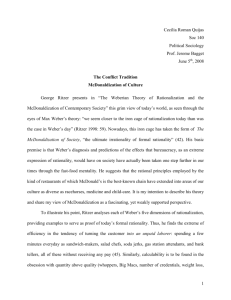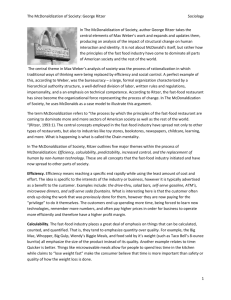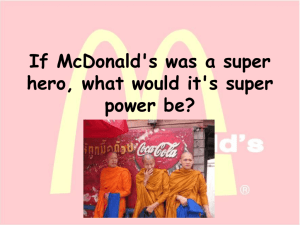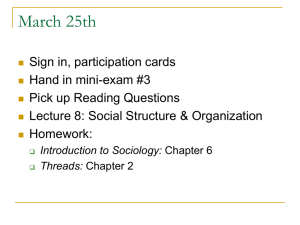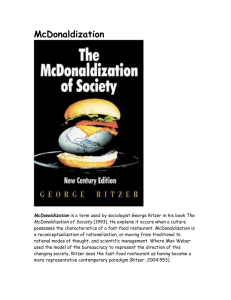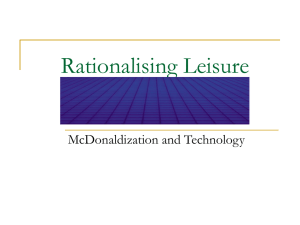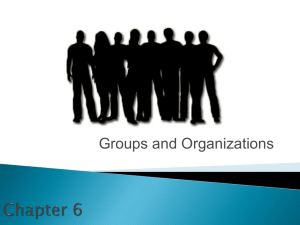File - Mickie Lienau's Portfolio
advertisement
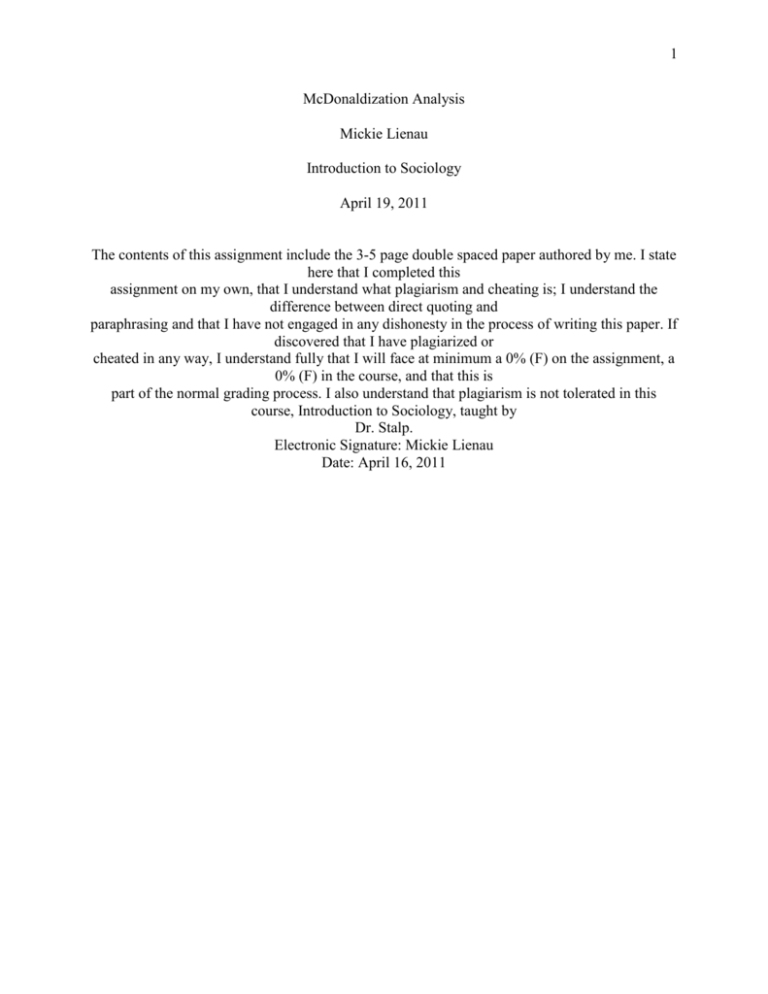
1 McDonaldization Analysis Mickie Lienau Introduction to Sociology April 19, 2011 The contents of this assignment include the 3-5 page double spaced paper authored by me. I state here that I completed this assignment on my own, that I understand what plagiarism and cheating is; I understand the difference between direct quoting and paraphrasing and that I have not engaged in any dishonesty in the process of writing this paper. If discovered that I have plagiarized or cheated in any way, I understand fully that I will face at minimum a 0% (F) on the assignment, a 0% (F) in the course, and that this is part of the normal grading process. I also understand that plagiarism is not tolerated in this course, Introduction to Sociology, taught by Dr. Stalp. Electronic Signature: Mickie Lienau Date: April 16, 2011 2 I. Introduction McDonaldization, according to George Ritzer, is the idea of striving for efficiency in everyday life, and it has become the main goal for most people. Efficient systems are an essential part of life, and if they become inefficient, people do not know how to handle them. Ritzer believes that McDonaldization has basically taken over the world, and forced it to participate in all the actions of a fast-food restaurant. George Ritzer has made many observations to prove his McDonaldization theory true. First, he talks about the self-checkout and how it depersonalizes your trip to the grocery store. Next, he mentions how drive through’s can actually be inefficient if they are not up and working properly. He says that sometimes going in to place your order is a lot faster than waiting in a drive through pile-up. Lastly, he talks about fast food restaurants in general. Many fast food places have become “workaurants,” and the customer is actually putting in all the work to serve themselves their food. These are just a couple of observations that Ritzer has made, and there are many more scenarios in this world that go unmentioned. McDonaldization has five aspects which are efficiency, calculability, predictability, control, and irrationality of rationality. These dimensions affect many parts of life that are encountered daily. I have chosen the Hy-Vee self-checkout as my cultural object that I will be analyzing since I use it often. II. Methodology McDonaldization has five different dimensions. The first dimension Ritzer talks about is efficiency. Efficiency deals with getting through every aspect of life in the fastest way possible. It can be compared to the assembly line where everyone does what they specialize in to get to the final product in the least amount of time and effort. 3 Next is calculability which refers to the way of life that is focused on numbers. Especially today, many people focus on what percentage, how much, and how many they are getting. An example of this would be a student’s GPA. Students have decided to focus on their learning experience in the grades they are getting rather than how much information they actually know. It has made the world lose focus on the quality of what they are getting instead of the quantity. The third dimension is predictability. Predictability deals with the way people think things should happen, and they always want to be right. An example of this would be robots because robots are programmed to be completely predictable. People often freak out if they are not able to predict what is happening, and this is because fast food restaurants are supposed to be predictable so we think everything should be the same. The next dimension is control. Many people believe it is the way people control technology, but it is the other way around. To demonstrate how technology controls us, all you have to do is look at a clock in the classroom. Each class only has so long to meet before it is considered over, so many people continue to look at the clock, and it becomes controlling. Especially today, technology has a huge control over us because we involve it in our lives so much. Lastly, is the dimension of irrationality of rationality. This explains the idea of drivethrough pile-ups. Many people view the drive-through to be faster and more efficient, but that is only if it is working correctly. If there is a pile-up and it is taking more time than it would have if you would have just went in, then that is the irrationality of rationality. As my cultural object, I chose the Hy-Vee self-checkout. It was easy for me to choose because I use it or see someone use it at least once a week. Also, they are not only found in Hy- 4 Vee, but in many other stores. This has made it easy for me to see the five dimensions of McDonaldization in action. III. Analysis Description: The cultural object I am analyzing is the self-checkout at Hy-Vee. It is a well-known chain grocery store in Cedar Falls that many college students use. Besides groceries, Hy-Vee has other household items you would need. It is a decently large store that employs nearly one hundred people. Efficiency: Hy-Vee’s self-checkout is efficient in the fact that is it able to get you through the checking out process faster if everything goes without error. Also, it is more efficient because you do not have to talk to the person checking you out, so that eliminates some time. The selfcheckout should make a trip to the store a lot faster. The self-checkout has become a streamlined process that is efficient so stores such as Wal-Mart and Target also use it. In the future, I think many other high-end stores will adopt this practice. It is streamlined because it provides efficiency for the customer. Many customers believe the self-checkout has no negative effects towards them; however if they think about it, they are doing all the work to checkout themselves. Stores use this technique so more people are able to get through their store, and their checkers have minimal work. Calculability: The self-checkout emphasizes calculability by having extra lanes where the customer can check themselves out. This makes their numbers grow because more people are able to get through the store faster. I think it emphasizes quantity over quality because stores are mainly 5 worried about their number of sales and customers going through rather than the quality of service they can offer them. This can be a negative aspect of the self-checkout. Predictability: The self-checkout emphasizes predictability when the customer can be positive that they can take their items to the checkout and ring themselves up effortlessly. They believe it is like a robot, and they will encounter no problems. Anyone who has used the self-checkout for a long period of time knows it is a routine, and they do the same thing every single time. The products are also predictable because many customers using the self-checkout take up minimal items that are staples in their households. Self-checkout has become a definite choice for most customers because they have little interaction with the workers, and they also complete their shopping in the fastest time possible if everything goes without error. Control: Control plays a major part in the self-checkout. First, technology can control the products you purchase. For example, if you are buying fruit, you must have a worker accompany you because you must have the code. Technology can also control you because sometimes the checkout does not read your products on the scale, and you might need a worker to reset the scale for you. There are many ways that the technology of the self-checkout can control the customer. IV. Critique I stand on the dividing line on how I feel towards McDonaldization. I agree with Ritzer when he says it is great when everything works in our favor, but it can be a disaster when an error occurs. I believe it is true that some systems become almost inefficient when they are trying too hard to be efficient. The self-checkout displays this because it can get the customer out of the store quickly if there are no problems, but if a problem occurs and they must call for help they will have to deal with a worker anyway and it will consume their time. 6 McDonaldization does cause dehumanization. Most people are looking for the fastest way to get things done with minimal interactions with other people. This is where we are losing our skills to be able to carry on a simple conversation with another person. Although it has all these negative effects, it cannot be considered evil. It has become inevitable in our society, and I think instead of blaming people and places, we must embrace it and think of ways to keep making it a positive. In conclusion, I believe if people think McDonaldization has become a problem in our societies then we need to take Ritzer’s advice and utilize local businesses to weaken our efficiency-based lives.

